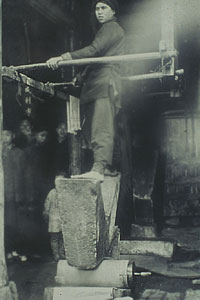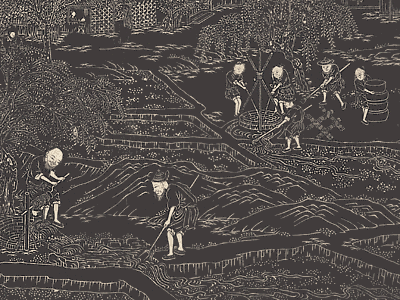China and Europe: 1500-1800
China: An "Early Modern" Society, Part 1
Market Sophistication
Here's another way in which the people in the Chinese countryside seem much more like farmers than peasants (if you have to choose between those two terms): They were deeply enmeshed in market relations. In fact the market in some ways had become a way of thinking about the world for them. Which is not to necessarily to say that they always liked it, but that they were used to it and thought of it as something that was to be expected. Land changed hands very regularly by the seventeenth and eighteenth centuries in China, in most parts of China.
Farmer, Not Peasant [VIDEO]
TRANSCRIPT: Many of the things that are part of our stereotype of the peasant—rooted in the soil, deeply traditional, reluctant to move or to innovate, often sort of suspicious of the market, prefers self-sufficiency—all of those things are part of our stereotype of the peasant. They are occasionally true. They are often untrue. But they're not true of the vast majority of Chinese farmers from, at least from say 1500 on. And probably from about 1000 on. At least in the most advanced areas
In some ways I think maybe the most stunning thing is the propensity to migrate. And we have this image of the Chinese (as) deeply attached to their native place and they won't move. Well, Chinese mass migrations in the early modern period dwarf anything in the early modern world. Something like five million Chinese moved just to the province of Sichuan in the eighteenth century. To give you a sense of what a huge number that is, in the entire 300 years from 1500, just after Columbus, to 1800, something on the order of one and a half million Europeans go to the New World. The vast majority of migrants to the New World in that period are actually Africans. And the huge European migrations come later.
So think about it. One and a half million Europeans to the New World in 300 years. Five million Chinese just to Sichuan, just in the eighteenth century. These are people who were not unwilling to pull up stakes. Yes, they're deeply attached to their native place, but that's often a ritual attachment that is not inconsistent with being able, willing and able, to go elsewhere.

Pressing tofu in China, c. 1906.
Courtesy Jean Elliott Johnson
It changed hands in extremely sophisticated ways. People were leasing land and then subleasing it. They were selling shares in the produce of a particular plot of land, and setting up what we would today call trusts. They were working out all sorts of complicated arrangements in which they got together to irrigate the land in a village, for instance. As part of these arrangements, they had an agreed-upon measure of how much that irrigation increased the productivity of a given piece of land, and then each landowner owed money back to the irrigation society based on those assumed benefits. Some of these were phenomenally complicated things. Moreover, the contract had become in many ways a metaphor for people's lives. Often people even approached the gods in a contractual way. They would go make an offering and, in fact, in a sense said to the god, "Here's my up-front payment. If you come through and my wife has a healthy son or my mother recovers from her illness or whatever, there will be a larger payment later."

Irrigating a cotton field in China, c. 1750.
C. V. Starr East Asian Library, Columbia University
In fact we have numerous documents in which people described their transactions with the supernatural world in terms of contractual relationships. Now that's not to say that they all loved a world bound by contractual obligations. Many people were deeply resentful. They might have thought that land should be a patrimony, that it was with a family forever, and they were resentful if they were displaced for another tenant who would pay a higher rent, for instance, just as many people are in our world today. But the fact is over the course of those roughly 200 years from say 1600 to 1800 or even 1500 to 1800, they came to take it for granted that this was the way of the world, and there was no point in fighting it. They took it so much for granted that they even thought that their relations with gods were determined by contracts. It was a really remarkable way of looking at the world. And it's fundamentally different from our stereotype of the Chinese peasant as so deeply rooted in the soil and tradition that he or she couldn't think about anything else.
Specialization of Tasks
The kind of specialization that we take for granted in the modern world requires certain kinds of skills and tools that make it advantageous for somebody to specialize in making soy sauce, and somebody else in cloth and so on and so forth.
Contractual Relations [VIDEO]
TRANSCRIPT: In a lot of settings around the world, whether it's lord-and-peasant in feudal Europe or patron-and-client in certain societies today, it was considered normal that when you gave labor you were giving something that's really part of you. It's your sweat and blood, and you would only give it in the context of a relationship that involves these unequal but lifelong bonds that are in some sense reciprocal.
A contractual relationship is a radically different thing. A contractual relationship says, "I need you to work for me for the next six months. And you need a job, so here's what you're going to do. Here's what I'm going to pay you. And the day after it's over, if I turn out to need more labor but you don't want to work for me anymore, you don't have to and it's my tough luck. And if on the other hand the day after you're done working for me you're in an accident, you need somebody to support you for the next six months, your tough luck. I don't have to do anything."
That kind of impersonal world in which economic ties have been detached from a whole web of wider relationships is, with some exceptions, mostly the world we live in today. It's the world we take for granted. But it had to come from somewhere. It wasn't always there. And interestingly enough, the first place where we really see it emerging on a very large scale is not in Europe as we might expect. It's in China, where you can really see this becoming a predominant mode of organization, beginning all the way back around the year 1000, and certainly becoming the dominant mode of economic organization by, let's say, 1600 at the very latest. And that's really 200 years before the French Revolution. It's a very, very big transformation, and that's the world of early modern China. It's this contractural world, for both better and for worse.
Specialization also requires a set of cultural presuppositions. You have to be willing to trust to strangers to make certain things, and say, "It's okay, I can buy soy sauce from this person. I don't have to worry that it's adulterated in some way and I'm going to get sick. And I trust that because I trust in certain kinds of impersonal mechanisms." That's very different from trusting the person who made it because you're married to them or because you sit next to them at church and they're your neighbor. It also requires that you not have a notion that even if it might be physically safe to get certain goods from a stranger, it would be ritually impure—you have to think of the thing you get as basically independent of whoever made it—which is far from being a universally accepted notion.
Today we trust strangers to make all sorts of things for us. But that process had to start somewhere and that's very much tied up with this growth of contract, this growth of impersonal relationships, and contract enforcement, and so on. And you see that developing really quite early in at least the more advanced parts of China, such as the Lower Yangzi. It's a crucial and often forgotten part of the development of a modern economy. One of the reasons why it makes sense to call China early modern from a fairly early date is that these attitudes were in place. They allowed people to specialize, rely on strangers, and that in turn allowed people to respond to market signals. If cloth prices rose, you made more cloth; if they fell, you thought about switching to something else. But you can only do that if you don't have to be self-sufficient, and make your own soy sauce, for instance, no matter what.